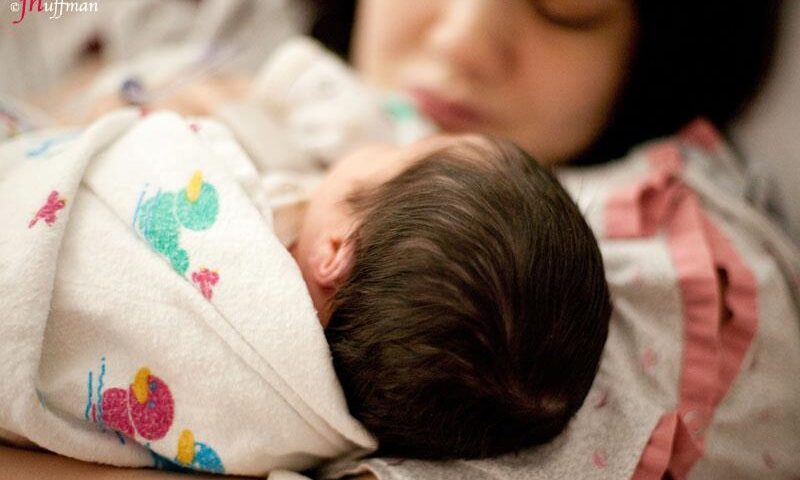I Didn’t Love My Newborn

I didn’t love my newborn. I had loved him before he was born. Through the pregnancy complications, the month of bed rest, I had loved him. Feeling him kick, seeing my huge stomach sway with his movements whenever my husband spoke. Knowing he was there brought me comfort when I was afraid. I even loved him when he had a foot wedged in my rib, as he often did. But here he was, my baby, finally in my arms, and I didn’t love him. “This is not how I’m supposed to feel.”
Nothing about my son’s entrance to the world happened the way I’d hoped. I’d planned for an unmedicated labor, complete with yoga balls and a jacuzzi tub. What I got, thanks to a terrible case of pre-eclampsia, was 20 hours of induced labor, ultimately ending in an emergency c-section. I was terrified. In place of soothing music and breathing exercises, I had a surgeon calling orders while a mask was held over my face. In place of the joy of witnessing my baby’s first breath, I had the nausea and confusion that comes with waking up from general anesthesia. I only vaguely remember the first time I held him. I had been so adamant before I was taken back to surgery, nobody but the doctors and my husband were to hold him before I woke up. I made my husband vow to never once let our baby out of his sight. I loved him then, fiercely and completely. But the first time I held him, I felt numb. I did not feel like a mom. The nurse at the hospital, a hardened 20 year veteran of the Labor and Delivery ward, must have seen it in my eyes, or the way I held him. “Take care of yourself, okay?” Her brow furrowed with worry as she handed me a pamphlet about post-partum depression.
I expected that, when we went home and settled into a routine, I would learn to love my baby. I didn’t. But in place of the numbness, a new feeling took over: complete inadequacy and self-loathing. “What kind of mother can’t breastfeed her own baby?” I berated myself in my head. My milk wasn’t coming in. I spent an hour nursing him, followed by thirty minutes of pumping, to try to encourage my supply to increase, followed by another ten to clean my pump parts. Then, 30 minutes later, it would be time to nurse again. I wasn’t sleeping. When I wasn’t nursing, I handed the baby off to my husband, and retreated to our bedroom to stare at the ceiling. I convinced myself that it was just the baby blues. It happens to lots of women. I would be okay, I just needed time. Besides, this couldn’t be post-partum depression, because I never thought of hurting my baby. Didn’t all women with post-partum depression want to hurt their babies?
I never wanted to hurt my baby. In fact, I was obsessed with making sure that my baby wouldn’t get hurt, and decided that the best way to keep him safe was to keep him away from me. I had visions in my head of all the things that could happen, all of the possible accidents. These thoughts penetrated my brain and wouldn’t leave me alone. What if I tripped and dropped him. I’d had fainting problems in the past, what if it happened while I was holding him? I didn’t want to be alone with him. What if he choked while I was feeding him and I didn’t know what to do? The more I passed him off on to my husband or other family members, who I deemed to be more competent than myself, the worse I felt. “You are the worst mom, and your son would be better off not knowing you. You should just kill yourself now, before he grows up and gets attached to you. Everyone would be better off.” My husband found me as I was penning my suicide note, to be given to our son on his 18th birthday. It was a letter of apology, letting him know that it wasn’t his fault.
I was admitted to the hospital that evening. Though I went voluntarily, the feelings of inadequacy and self-loathing hit their peak. “What kind of mom has to go to the mental hospital? You’re crazy, and you don’t deserve to be a mom.” But then something happened. I was given an anti-anxiety medication, and I slept through the night for the first time since before my son was born. I talked to a therapist, and I talked to my fellow patients. I talked, and I wrote, and I painted, and I started on medication. Though I was only in the hospital for four days (as is the case with most inpatient hospitalizations- insurance will only let you stay until you’re no longer a danger to yourself), I had reached a turning point. When I was discharged, and saw that my family had brought my baby with them to pick me up, I felt something I hadn’t felt before. I felt joy. I remember seeing him, so tiny. I remember the little baseball uniform onesie he was wearing. I remember holding him, showing him off to the other patients and I was leaving. Mostly, I remember smiling. I was discharged from the hospital on my first Mother’s Day, and I finally felt like a mom.
I’d be lying if I said things were perfect after I got out of the hospital. They weren’t. There were setbacks and tears. There were days that I still struggled with the guilt and shame that often come along with mental illness. For a long time, I never used the words “post-partum depression,” because of the stigma attached to that term. I still grieve, and have too many “I wish” thoughts. I wish I’d have known that, having struggled with depression off and on through my adolescent years, I was at a higher risk of post-partum depression. Traumatic birth experiences also increase the risk of post-partum depression and anxiety. Mostly, I wish I’d have known how common these conditions are, and that having these conditions didn’t make me a bad mom. Maybe then I’d have sought help sooner, and my depression would have never escalated to the point where I was suicidal.
The biggest takeaway from my experience with post-partum depression is the importance of self-care. I check in with myself regularly. “How are you feeling? Are you stressed? Do you need a break?” Sometimes I pass my son, who is now four years old, off to his grandparents for the night so that I can read and enjoy a glass of wine. I went back to college, and enrolled my son in daycare. The more I accomplish outside of my role as mother, the more I enjoy being a mother. There’s this societal explanation for mothers to be selfless, for our whole worlds to revolve around our children. For me, that expectation is unrealistic and harmful. Some mothers take easily to the role, and flourish as stay at home moms. Not me. My son is the biggest part of my world, and I love him wholeheartedly. But he is not my whole world. And that’s okay. That does not make me a bad mom. It’s what I need to do to be a healthy mom, capable of loving and taking care of my son.
Misty Opat is a Women’s Studies student at Kansas State University. She is a member of K-state’s student feminist organization, FIRE, which is an URGE affiliate chapter.
Photo of the author and her son by J Huffman Photography

